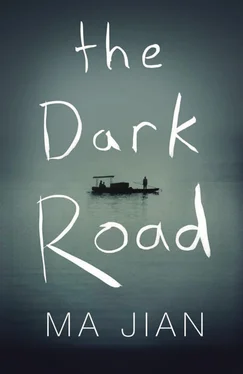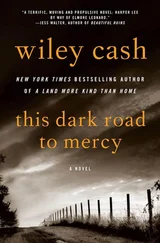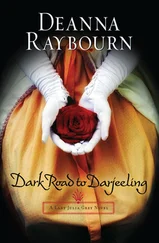‘Class One Protection for fish, indeed! What about us humans? When will we be able to return to our place of origin?’ Meili grasps the bottle of lemonade Nannan is drinking and takes a quick sip.
‘The Yangtze has become so polluted, there are only a few hundred sturgeon left. And when the dam is finished, their migration route will be completely cut off. They’re doomed to extinction.’ Kongzi watches the sturgeon sink below the surface. As he slows the boat down, Meili crawls to the bow. The breeze moving through the blazing summer heat feels cool and refreshing. Grassy embankments, mud houses and mandarin trees slip by on both sides. Her fears seem to blow away. Closing her eyes, she imagines soaring over the golden waters like a wild goose, the river mist in her face, seeing the boats and barges behind her form dark silhouettes against the low sun and the Yangtze stretch into the distance, dissolving finally between two cliff faces into a haze of water and sky.
She begins to sense that drifting down the river could offer her a new way of life, a floating happiness. She feels free and at peace.
Kongzi notices a barge approach and bites his lower lip nervously. He’s never driven a boat before, and is afraid of colliding. In a fluster, he decelerates too quickly and the engine stalls. Once the barge has passed, he pulls the start cord again, adjusts the throttle and the boat sets off once more. Eager to regain face, he slows the boat, throws it in reverse then artfully turns it in a circle. Looking both surprised and proud, he glances back at Meili and says, ‘As my great ancestor Confucius once remarked: “The benevolent find joy in mountains, the wise in water.” How right he was! When he left home after offending the Duke of Lu, he wandered from state to state for thirteen years, an exile in his own country. Now two thousand years later, I’m also on the run, but unlike him, I’m not free to travel across the land, so all I can do is drift down the Yangtze.’
At noon, before Nannan has woken from her morning nap, Meili goes to the tiny galley area in the stern, lights the kerosene stove and puts a pan of water on to boil. Beside her is a mound of spinach leaves she cleaned earlier. Whenever she needs to wash vegetables or clothes, she simply leans overboard and scoops up a bucket of water. Thrilled to have a place of their own at last, she has already scrubbed the boat from stern to bow, torn off the mouldy bitumen canopy and replaced it with new tarpaulin. Now when they sleep in the cabin at night, they’re no longer disturbed by a musty smell of rot. Meili has also tied a rope from Nannan’s waist to the cabin frame, short enough to prevent her leaning overboard to dip her hands in the water. But Meili can’t stop the boat rocking. Although she feels more free on the water than she did on the land, she knows it will take time for her to become used to this fluid substance that adapts its form to the contours of the earth and exists in constant flux. The river is a moving landscape which flows in directions she can’t always determine.
After becoming pregnant with Happiness, the earth no longer felt solid underfoot. Not even their house or the dugout Kongzi created beneath Nannan’s bed could provide a safe refuge. The land belongs to the government. Whether it’s rented or borrowed, every patch of soil in this country is controlled by the state; no citizen can own a single grain. If she’d stayed planted in the village like a maize stalk waiting to be trampled on, she too might have had her belly injected with disinfectant like Yuanyuan, or been bundled into a cart a few weeks after childbirth like her neighbour Fang, milk leaking from her bare breasts. Ever since they left the village, her muscles have clenched with fear as soon as her feet touch the ground. Although the barge hotel was on the river, it was in effect an extension of the town. But this wavering fishing boat has liberated her. She will learn to drive it and survive on the little they possess. She told Kongzi that in Guangdong Province there’s a place called Heaven Township where people can have as many children as they wish, making sure, of course, not to tell him that its polluted air renders men sterile. Kongzi said that this was just the kind of enlightened place where Happiness should be born.
‘Cooking lunch?’ Meili calls out to the pregnant woman in the houseboat moored a few metres away. ‘It smells good.’
The woman is sitting at the bow, her toes like chicken claws gripping the edge of the boat. She and her husband already have a baby, and two daughters who are old enough to go into Sanxia and buy provisions on their own. Meili glanced at the baby when the woman held it over the river to defecate, and saw that it was a girl. The woman’s boat is twice the size of Meili’s. It has a tall control room and a shorter cabin behind with a bitumen-coated felt roof held down with bricks. When the boat is stacked with polystyrene panels the husband hauls to construction sites, it looks like a sparkling iceberg. While he’s away on a trip, the woman and her daughters often wander around the wharf, hawking home-made snacks, shaking plastic bags of eggs boiled in tea, spiced tofu and marinated broad beans below the windows of buses waiting to board the ferry.
‘It’s imported Thai rice,’ the woman calls back to Meili. ‘I bought it in the supermarket. What are you having?’
‘Fried celery and some reheated chicken soup.’
‘You shouldn’t drink hot liquids in the middle of the day,’ says the woman, hoisting up a bundle of garlic shoots she’s been soaking in the river. ‘And with a belly that size, you should move more slowly around the boat.’
‘Let those soak a little longer if you want to wash off the chemicals. I planted half a field of garlic shoots last year and had to spray pesticides on them twice a week to keep the insects away.’
‘No need — I’m going to boil them for ten minutes. The river water may look clean, but it’s riddled with threadworm.’
Meili grimaces. They’ve been drinking boiled river water since they moved onto the boat. ‘But the water’s safe to drink, surely, if you boil it?’ she asks.
‘No, not at this time of year! You should fetch your drinking water from the barge hotel’s washroom. Go at lunchtime when no one’s about. Or give the man at the diesel station a couple of mao and he’ll let you fill your bucket at his tap. You can drink river water in the winter, but in the summer, it’s infested with germs and parasites.’
‘How come your stove doesn’t give off smoke?’ Meili asks, looking at the broad beans the woman has laid out to dry on the deck.
‘It’s a gas stove. Cost me a hundred yuan. Come and have a look at it, if you want.’
Meili fetches her hooked bamboo pole.
‘Always turn off your stove before you disembark,’ the woman says, her eyes beady as a cormorant’s. ‘If it topples over, your boat will burn to a cinder.’
Meili extends her pole, drags the woman’s boat towards hers then ties them together with rope.
‘The current is strong,’ the woman says. ‘Your boat will break free with a knot like that.’ She loosens Meili’s knot and reties it. ‘This is a bowline knot. It won’t slip.’
‘I should learn how to do that,’ says Meili, gripping her canopy. She glances into the woman’s spacious cabin, and inhales the fragrant smell of rice wafting from the pot on the gas stove.
After checking that Nannan is still asleep, Meili steps over onto the woman’s boat and squats on the cabin’s vinyl-covered floor. ‘What a great stove!’ she says, and looks at the clothes and hats hanging neatly on the wall next to a glossy calendar with a photograph of a woman in a long silver dress.
‘You should buy one. One canister will last you a whole week. And another tip: when a large vessel approaches head on, slow down and turn towards the bank so the waves hit you at right angles, or your boat will capsize. Ha! I could tell from the way you were gripping your canopy just now that you haven’t been on the river long. Is that your daughter sleeping in the cabin? Make sure she stays inside when the boat is moving, or she might fall overboard.’
Читать дальше












